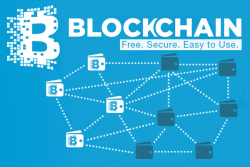 Recently I was asked by my latest big client to start a new column. As always, not much money in it, but lots of good learning ahead.
Recently I was asked by my latest big client to start a new column. As always, not much money in it, but lots of good learning ahead.
It is a tech column. Specifically, it’s about financial technology, or fintech.
Square is fintech and Apple Pay is fintech. But they’re all fintech of a type we have had now for two generations, ever since the Los Angeles Chargers derived their name from a credit card, Carte Blanche. They’re taking existing payment networks and putting them inside cell phones, or providing access through the phones.
They’re not that exciting.
You know what is exciting? Blockchain is exciting. Over the next 10 years blockchain is going to kill more jobs than the self-driving car. (Don Tapscott, to the right, was an early blockchain advocate. Follow him on Twitter.)
At its heart, a blockchain is very simple. Think of a database. Now imagine that each entry in that database is encrypted. Now imagine that the entries are connected, just like entries in a database are often connected, but in the form of a general ledger.
Now you’ve got a blockchain.
 We think of blockchain in terms of its first implementation, Bitcoin, the virtual currency, but that’s a very limited way of looking at it. Bitcoin set up a decryption scheme so computers could “mine” new coins, up to a point, and we’re approaching that point. Each coin becomes part of the blockchain, and so do the transactions made with it. The number of Bitcoin in circulation is limited. Bitcoin is also private, outside government control.
We think of blockchain in terms of its first implementation, Bitcoin, the virtual currency, but that’s a very limited way of looking at it. Bitcoin set up a decryption scheme so computers could “mine” new coins, up to a point, and we’re approaching that point. Each coin becomes part of the blockchain, and so do the transactions made with it. The number of Bitcoin in circulation is limited. Bitcoin is also private, outside government control.
When Bitcoin launched eight years ago, we talked of things costing a Bitcoin, or several Bitcoins. Now we talk about things costing fractions of a Bitcoin, because each coin is now worth over $1,000. If Bitcoin takes off, we’ll be talking about things costing a millionth or a billionth of a coin. Those who got in on the ground floor will be filthy rich. That’s the appeal.
But the appeal is limited, and ideological. Technology is naturally deflationary, thanks to Moore’s Law. Today’s phone replaces a host of other devices from a decade ago, and for just a few hundred dollars. Cloud prices start at free, and for plenty of capacity to get work done, as any Gmail user will tell you.
If Bitcoin replaced dollars, prices would decline, but as we saw during the Great Depression your salary would go down faster, and soon no one would be working. As an economic system, Bitcoin is crazy. As an alternative market, it has limited appeal.
Unlike Bitcoin, the blockchain technology is not limited.
 Blockchain can automate any economic process, taking people out of it. Once your identity is in a financial blockchain, and you add your personal details to it, no one in that system asks any more questions. They just access the block, they respond to the block, and transactions are added to the chain.
Blockchain can automate any economic process, taking people out of it. Once your identity is in a financial blockchain, and you add your personal details to it, no one in that system asks any more questions. They just access the block, they respond to the block, and transactions are added to the chain.
Think of mortgages. They’re complex. But if every applicant is a block, if every possible loan is a block, if every participant in the market is a block, things move much more smoothly. Algorithms can now be built that portion out mortgages, that calculate the deals, and that handle all the back-office functions.
That eliminates a lot of jobs. The same thing is true for bankers, for brokers, and for all kinds of financial intermediaries. Blockchain eliminates all their paperwork. Data is entered once, it’s under the control of the person entering it, it’s anonymized, and all those questions of bias that employ so many lawyers also go away.
Yes, legal jobs are going to disappear as well. So are the jobs of a lot of insurance adjusters. You collect the data once, you run it through the algorithm, and the answer comes out the other side. That’s true both in applications and collections.
 Blockchain applications are only limited by the imagination. Anything that involves the movement of money can, in theory, be automated, or at least reduced to information collection, which will be self-service, using a blockchain. Beyond creating more programming jobs, and more millionaires, blockchain will also create some management jobs, exception handling jobs, and jobs for lawyers arguing about authority for specific chains and blocks. But for every job created by blockchain, 10 disappear.
Blockchain applications are only limited by the imagination. Anything that involves the movement of money can, in theory, be automated, or at least reduced to information collection, which will be self-service, using a blockchain. Beyond creating more programming jobs, and more millionaires, blockchain will also create some management jobs, exception handling jobs, and jobs for lawyers arguing about authority for specific chains and blocks. But for every job created by blockchain, 10 disappear.
Here’s an entire profession that can be eliminated. Medical coders. There are colleges right now scamming young people into paying for courses that will, supposedly. get them jobs as medical coders, turning doctors’ diagnoses into entries for payment. It’s called health informatics, and demand is said to be exploding.
That whole process can become a blockchain. No more filling out forms at the doctor’s office. He’ll just take your card and attach himself to your blockchain.
Blockchain also has huge political implications.
At the heart of the Republican Party coalition are financial intermediaries. People who work in offices pushing paper make big money, and so do the people who build those office towers.
What happens when those jobs disappear? What happens to the people affected? We saw an early version last year – those people went ultra-nationalist and voted for Trump. But Trump is in office, and the job destruction among these people is only going to accelerate over the next few years.
 Our economy is already skewed toward a very small number of winners. The biggest shareholders of a few technology companies are worth more than everyone else combined. Blockchain accelerates this trend. A few more names get added to the list, but at the expense of millions of other people.
Our economy is already skewed toward a very small number of winners. The biggest shareholders of a few technology companies are worth more than everyone else combined. Blockchain accelerates this trend. A few more names get added to the list, but at the expense of millions of other people.
The oil era was mercantilist. Our troops have acted like the British under the Raj, capturing access to vital resources, creating wealth based on control. Will the technology industry become feudalist, a few lords and ladies ruling eternally over an ever-growing number of serfs? Or will democracy demand something different?
There are jobs that need doing. The environment needs to be repaired. Old age must be dealt with. People must learn at an accelerating rate. What’s lacking are business models for this work. It doesn’t pay, now, to reduce pollution, while it does pay to create it. Blockchain may help us create those business models. Without them your grandchildren won’t have a habitable planet to live on.
The blockchain revolution has just gotten started, and while I’m not on the ground floor, I’m early enough onto the beat that I should be able to enjoy a nice ride. As with my past beats – the Internet, education, health IT, open source, e-commerce, etc. – this is going to change the world.
Hopefully, I’m not too old yet to be thrown off the learning curve. Probably, I’m old enough that I can retire while the ride is still going on.
Life is about to get very interesting.










Hi nice article and also helpful. We are also Blockchain Development Company,
if you looking for Blockchain services we are here to give you the best solution.
A blockchain is a digitized, decentralized, public ledger of all cryptocurrency transactions.
Constantly growing as ‘completed’ blocks (the most recent transactions) are recorded and added to it in
chronological order, it allows market participants to keep track of digital currency transactions without
central record keeping.
Hi nice article and also helpful. We are also Blockchain Development Company,
if you looking for Blockchain services we are here to give you the best solution.
A blockchain is a digitized, decentralized, public ledger of all cryptocurrency transactions.
Constantly growing as ‘completed’ blocks (the most recent transactions) are recorded and added to it in
chronological order, it allows market participants to keep track of digital currency transactions without
central record keeping.